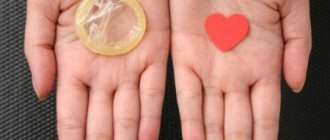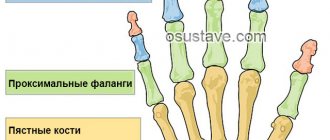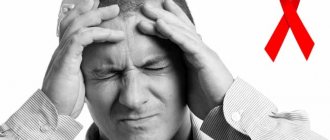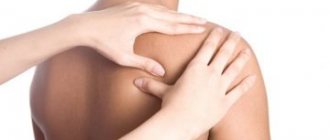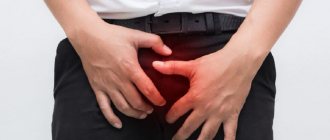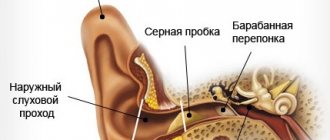Pain syndrome when urinating
Various pathological processes that develop in the genitourinary system cause discomfort in a man and disrupt his vital functions. Various diseases that require the intervention of a specialized doctor can provoke pain when urinating.
Pain syndrome is the first sign of the development of a serious inflammatory process. A man should undergo an examination and not delay his visit to a urologist. We are talking about urethritis, cystitis or prostatitis. The diseases are accompanied by characteristic symptoms and require treatment. Without therapy, the risk of complications and consequences increases.
Features of painful phenomena
Painful sensations during the development of pathologies can be different; for an experienced doctor they are a kind of compass that helps determine the essence of the problem:
- Pain that occurs at rest. Most often, this is due to excessive distension of the bladder. This condition can cause inflammatory processes in its membrane (cystitis), the formation of malignant neoplasms.
- Pain that appears at the beginning of urination. This symptom most often accompanies the formation of urethritis.
- Pain that occurs during urination. The reason may be a contraction of the organ, which is caused by the presence of cystitis, various neoplasms and urinary-salt diathesis.
- Pain after passing urine. The contraction of the prostate gland and the triangle of the bladder manifests itself in a similar way. As for the pathological conditions leading to this result, the reason may lie in prostatitis, cystitis, prostate cancer and neoplasms of the triangle of the bladder, prostate adenoma and calculi.
A “telling” and very ominous symptom that accompanies pain is the blood released along with urine. In this case, immediate contact with a medical facility is necessary. Diseases in which such symptoms occur include gonorrhea and genital herpes, malignant neoplasms in the reproductive system and necrosis. Pain and bleeding can accompany inflammation in the urethral canal; very rarely cystitis or urethritis manifests itself in this way.
Localization of painful sensations
The location of discomfort can also help determine the cause of the pain:
- Unpleasant sensations in the abdomen that appear during and after urine output indicate the presence of stones in the bladder.
- Painful urination in men, in which the source of discomfort is concentrated in the groin area, occurs with prostate pathologies. This could be prostate adenoma or prostatitis.
- If painful sensations are concentrated in the head of the penis and appear at the end of urine output, the formation of cystitis, provoked by chlamydia, E. coli or staphylococcus, can be suspected.
- Painful impulses in the lumbar region that appear during and after the end of urination indicate infection or stones formed in the bladder.
Separately, pain in the urethral canal should be considered, since most diseases of the urinary system manifest themselves this way. The same urethritis leads to inflammatory processes in the canal, hence the pain and, in addition to it, the appearance of pain and pathological discharge in the morning. Chlamydia, urolithiasis, trichomoniasis and chlamydia can manifest themselves as pain. However, we will consider the most common diseases in more detail below.
Causes and symptoms of discomfort
There are some diseases in men that are accompanied not only by painful sensations. Additional signs of pathological processes appear. It is important to consult a doctor in a timely manner, undergo a full examination and treatment.
Chlamydia
We are talking about a sexually transmitted infectious disease. Kidney function and urinary function are impaired. The causative agents of the pathology are Chlamydia Trachomatis. Pathogenic microorganisms affect the male reproductive system and urinary tract. The disease is characterized not only by pain during urination. Pain, discharge, burning and itching appear.
Painful sensations spread to the lower back, testicles, scrotum and urethra. The patient's body temperature rises. The urine becomes cloudy and purulent threads form. Without treatment, chlamydia leads to serious complications in the form of bleeding during ejaculation or urination. In some cases, the disease occurs without a pronounced clinical picture.
Gonorrhea
The causative agents of the pathology are bacteria – Neisseria gonococcus. Pathogenic microorganisms spread throughout the genitourinary system. The urethra is also affected. Symptoms:
- painful sensations;
- cramps appear when emptying the bladder;
- high temperature at the acute stage;
- swelling of the external urethral area.
Violations are accompanied by pale yellow or yellow-green discharge.
Urolithiasis disease
Pathological processes develop due to the formation of stones of various sizes in the genitourinary system of the male body. The presence of stones in the bladder causes the following symptoms:
- pain;
- pain syndrome appears;
- there are problems emptying the bladder.
When moving the stone, the patient feels pain. Depending on its location, discomfort is felt in the perineum or genitals. Increased protein contributes to an increased urge to urinate. At the same time, the stream is weak and the man does not feel complete emptying. After changing body position, the urge appears again.
Urethritis
The disease develops due to the development of pathogenic microflora. A bacterial infection causes the following symptoms:
- Pain and cramps that appear when urinating or are constantly present.
- Characteristic discharge.
- During an exacerbation of urethritis, a man complains of severe pain.
- The chronic form of the disease is accompanied by tolerable pain, burning and morning discharge.
Clinical signs vary. After a while, the patient notices purulent mucous discharge, accompanied by an unpleasant odor and having a blue-green color.
Trichomoniasis
Venereal disease. Pathological processes disrupt urination and cause severe pain in the patient. Trichomoniasis occurs due to the proliferation of protozoan parasites in the sperm and prostate.
Symptoms of the disease:
- inflammation of the urethra;
- pain;
- a burning sensation appears;
- pain.
The functioning of the genitourinary system is disrupted. Patients complain of a frequent urge to urinate in the morning. White purulent discharge comes out along with the urine. Trichomoniasis is characterized by blood streaks in the semen.
Prostatitis
Inflammation of the prostate gland causes problems with urination. In urology, prostatitis is the most common disease encountered by representatives of the stronger sex. Pathological processes develop due to damage to the organ by the Candida fungus. The same thing happens when infected with an infectious disease. We are talking about the herpes virus, gonococci, trichomonas.
Inflammation of the prostate gland is accompanied by pronounced symptoms:
- painful sensations;
- pain;
- the tissues of the affected organ swell and become inflamed.
With prostatitis, severe pain appears that moves to the scrotum, perineum or lower back.
Cystitis
The disease is characterized by inflammation of the bladder. Accompanied by characteristic symptoms:
- frequent urination;
- pain in the lower abdomen;
- urinary incontinence.
Laboratory tests will show the presence of pus. The pain gradually intensifies and becomes permanent.
https://youtu.be/AkA6MruKsa8
How to treat such pain?
To determine how to treat pain and burning urination, a man needs to see a doctor. Only an experienced specialist, based on diagnostic data and the identified cause of such symptoms, can select the necessary medications.
The following medications are used to treat such pain:
- antimicrobial and antibacterial agents in case of bacterial infection;
- antispasmodic drugs for pain relief;
- antifungal drugs;
- immunomodulatory agents to increase the body's resistance to pathogens;
- herbal remedies to relieve the inflammatory process.
Sometimes diuretics may be used to clear the stagnation of uric acid and urine in the ureters and ducts. It is also important for a man to always keep his feet warm, since hypothermia is the biggest enemy of the genitourinary system.
Therapeutic tactics largely depend on the etiology, i.e. reasons that caused pain and discomfort when urinating. It is important to note that taking analgesic drugs without any consultation with a urologist only hides and blurs the picture; such treatment is incomplete. Symptomatic therapy cannot affect the cause of the disease, which means that it will continue to progress.
With such a banal problem as urethritis, even treatment with folk remedies can help, and the disease goes away within a few days. Similarly, for cystitis, taking herbal medicines in the form of herbal preparations, teas and decoctions will have a positive effect on inflamed mucous membranes, since most plants have a good anti-inflammatory and antispasmodic effect.
Flaxseed for the treatment of cystitis
1 tbsp. l. seed must be poured with cold water (1 tbsp.) and let this mixture boil for exactly 5 minutes. Cool the resulting infusion. Drink three times a day, preferably a glass before meals.
Echinacea for the treatment of cystitis
1 tsp. echinacea is poured with boiling water (1 tbsp.). The prepared decoction should sit for 3 hours, this is the minimum time. You need to drink the infusion twice a day, in the morning and in the evening.
Aspen buds for the treatment of cystitis
Aspen buds must be filled with vodka. Proportion – 1:10, leave for at least 10 days. It is necessary to take the infusion 25-30 drops three times during the day. You need to drink the infusion for at least two weeks.
Collection of herbs for cystitis
The collection includes the following herbs - St. John's wort, chamomile, lingonberry leaves, black poplar buds.
All components are mixed in equal quantities, 2 tbsp. l. Pour boiling water (0.5 l) over the resulting mixture. Next, the almost finished broth should be poured into a thermos without straining and allowed to stand for 12 hours. Drink 1/3 cup three times a day.
Another collection of herbs for cystitis
The collection includes the following herbs - horsetail, birch leaves, juniper, bearberry leaves (another name is bear's ears).
Herbs are mixed in the following ratio: 1:2:2:2. Place two tablespoons of the collection mixture in a half-liter thermos and pour boiling water over it. It is best to let the broth sit overnight.
It is taken according to a similar scheme: 3-4 times a day, a third of a glass, with the same duration of treatment.
If a more serious problem is identified, then drug therapy cannot be avoided. If pathogenic flora in the form of bacteria or fungi is detected in a urethral smear, the doctor prescribes antibacterial or antifungal therapy. The use of antibiotics can effectively combat the disease that causes pain during urination.
It is important to note that in addition to drug therapy, it is necessary to remove the factors that caused the disease. You need to maintain personal hygiene, you should abstain from sexual activity during treatment, and you need to try to get rid of bad habits. Only then will the treatment be as short and effective as possible.
Diagnostic measures
Examination methods and additional tests allow you to establish an accurate diagnosis and prescribe the most effective treatment. The doctor takes into account the patient’s complaints, conducts instrumental and laboratory examinations.
Diagnostic methods:
- Urethral smear . The analysis is prescribed to patients with urethritis. Based on the results, the most suitable antibacterial drug is selected.
- Ultrasound examination and contrast radiography . The examination will allow you to determine the location of the source of pathology in urolithiasis.
- Rectal diagnostics . During palpation, the specialist determines the condition of the prostate.
- Contrast urography and retrograde urethrography . During the procedure, the doctor determines the degree of disturbance in the process of urination.
Based on the results obtained, the doctor will select effective therapy.
Treatment of painful urination in men
Pain during urination itself cannot be treated.
It is necessary to treat the underlying disease that caused the symptoms.
Eliminating the cause in most cases is possible using conservative methods.
Sometimes surgical treatments are used.
Most often, painful urination is the result of inflammation.
It is caused by one or another microorganism.
To suppress their vital functions, antibiotics, antiprotozoal, antifungal or antiviral agents are prescribed.
The choice of drug depends on the data obtained from the examination of the patient.
Usually the doctor is able to determine the type of pathogenic microorganism.
He prescribes those medications to which he is sufficiently sensitive.
Additionally, local treatment can be used.
Instillations of antiseptics are prescribed - washing the urethra and bladder.
The procedure is carried out twice a week.
It helps to quickly destroy microorganisms and get rid of pain.
Treatment methods
Proper therapy prescribed by a qualified doctor increases the patient’s chances of a speedy recovery.
Drug treatment
Patients are advised to adhere to medical recommendations. Avoid self-medication to avoid negative consequences.
- Urethritis . The doctor determines the causative agent of the pathology and prescribes antibacterial drugs to the patient. Chronic urethritis is more difficult to treat. Specialists use additional stimulating and restorative medications.
- Urolithiasis disease . Large stones are removed using ultrasonic crushing. If the stone is highly mobile, surgical intervention is recommended for patients.
- Inflammation of the prostate gland . To combat chronic prostatitis, complex therapy is required. The doctor prescribes antibacterial and restorative agents for the man. Additionally, she recommends attending physiotherapeutic procedures and prostate massage. Prostatitis at the acute stage is treated with non-steroidal anti-inflammatory drugs and antispasmodics. Electrical stimulation and magnetic therapy are effective. The duration and result of treatment depends on the stage of development of the inflammatory process and the severity of organ damage.
- For pain in the urethra, a man is prescribed individual therapy with antibacterial and antifungal drugs . In case of formation of stones or malignant tumors, the doctor recommends surgery.
During treatment, patients are advised to follow a special diet. It is necessary to avoid salty, spicy, smoked and sour foods. They affect the composition of urine and negatively affect the condition of a man. A healthy lifestyle will allow you to recover faster and prevent serious complications during treatment. It is important to give up smoking and alcohol, and engage in physical exercise without overexertion.
ethnoscience
There are a large number of recipes from healers and healers that help reduce pain when urinating. It is important to discuss therapy with your doctor to prevent the development of complications.
Effective recipes:
- A decoction based on medicinal herbs. We are talking about St. John's wort, centaury, bear's ear.
- Parsley and carrots help to cope with painful sensations when urinating. A tincture should be prepared from these components.
- You can apply compresses with mashed onions to the affected area.
- Warm baths are allowed. Add chamomile decoction and tea tree essential oil to the water.
- Patients can apply compresses made from raw cabbage and potatoes.
Traditional medicine helps eliminate pain and get rid of the inflammatory process. Treatment must be comprehensive. The patient, using folk remedies, is under the supervision of a specialist and periodically undergoes tests. The doctor will see the effectiveness of the therapy and make adjustments.
It is important to consult a specialist in a timely manner, establish an accurate diagnosis and undergo treatment. Without qualified help, complications and serious consequences may occur.
Which doctor should I contact?
The best solution would be a timely visit to a specialist - a urologist for consultation, diagnosis and prescription of correct and qualified treatment. In most cases, an inflammatory disease that causes pain when urinating can be treated on an outpatient basis. Thus, treatment at home is no different from inpatient treatment, but it is important to note that home treatment is still prescribed by a urologist or andrologist.
Self-medication can be dangerous to health, because only a qualified specialist with extensive practice can adequately assess the patient’s condition and prescribe effective therapy. Having contacted a urologist, the specialist will talk with you, collect all the important data related to the disease, conduct an examination to identify pathological symptoms, and then prescribe the diagnostic procedures necessary to establish an accurate clinical diagnosis.
In most cases, the diagnostic complex includes a general blood and urine test, cystoscopy (if indicated), taking a smear from the urethral canal and ultrasound examination of the pelvic organs as a non-invasive method for assessing the condition of the bladder and prostate gland. Only after all these stages can complex and complete treatment begin.
In order to determine the etiology of pain and the reasons for this occurrence, a man needs to go to the hospital. Various specialists can deal with such issues, so first you can visit a therapist. He can prescribe standard diagnostic measures, on the basis of which he can refer the patient to the right specialist - a venereologist, urologist, nephrologist, andrologist or infectious disease specialist.
This is a breakthrough! A drug has been invented - an analogue of surgical correction of the size of the male penis! Read here {amp}gt;{amp}gt;{amp}gt;
For reference! If the disease cannot be treated with medication, surgery may be required, so the patient will be referred to a surgeon for consultation. If there is pain with blood, the man will need to visit an oncologist.
https://youtu.be/Ii29TYbopL0
Associated symptoms
In addition to pain, the patient may experience other symptoms during urination. Even minor discomfort should be a reason to contact a specialist. Typically, pain appears during bowel movements, but after a while the patient constantly feels discomfort.
It spreads to the genitals, bladder area, scrotum, and sometimes extends to the lower back. Almost always, the condition worsens gradually, disorders of the reproductive system, lack of erection, and decreased libido appear. Next, a burning sensation appears in the area of the urethra and bladder, itching. Upon examination, you can see that the mucous membrane around the opening of the urethra is hyperemic and swollen.
If the cause of the pain is chlamydia or gonorrhea, white or greenish discharge and an unpleasant odor appear. As the number of pathogens increases, the symptoms worsen, and symptoms of cystitis and urethritis appear. Sexually transmitted diseases rarely occur in a latent form; only an incubation period is possible.
In the absence of therapy, the pain intensifies, spreads to the entire pelvic area, and general symptoms appear. The patient feels weak, dizzy, his performance decreases, and his appetite worsens. In acute cases of urethritis or cystitis, there may be an increase in body temperature, pain in muscles and joints, and sleep disturbances.
If the cause of the symptoms is pyelonephritis, stones or sand in the kidneys, pain appears in the lumbar region. When one kidney is affected, it is one-sided, sharp or aching, and intensifies with percussion. The patient's urine becomes cloudy, sometimes there is an admixture of pus, sand, and blood. The smell is pungent, the color is rich. In advanced cases of urethritis and cystitis in combination with urolithiasis, the urine turns pink or reddish.
Typically, severe symptoms are observed in the absence of therapy. If the patient consults a specialist when the first signs appear, the clinical picture does not worsen and complications can be avoided.
https://youtu.be/i1JBXxDSgLs
Symptoms
Dangerous manifestations of the disease are those that are accompanied by additional symptoms.
The patient should be alert to the following signs:
- pain in the lumbar region, perineum and lower abdomen;
- specific discharge from the urethra;
- cloudy urine;
- elevated temperature;
- weakness, fatigue and dizziness;
- discomfort during sexual intercourse.
If these signs appear, especially if they last more than two days, you should not delay treatment. To do this, you need to visit a urologist.
Diagnostics
Let's look at what procedures a urologist will prescribe during diagnosis:
- Analysis of morning urine - reveals the presence of infections and red blood cells. The presence of red blood cells indicates urolithiasis, since injuries to the walls of the urinary system provoke the release of blood.
- Blood tests - detect the presence of inflammation and may indicate kidney failure.
- Ultrasound examination of the genitourinary system.
- Radiography to determine the location of stones.
- Taking a smear from the genital tract reveals sexually transmitted infections.
- Palpation of the prostate - shows the degree of inflammation of the prostate.
Preventive measures
Experts recommend taking preventive measures to prevent inflammation in the body. So, in order to prevent infection with sexually transmitted infections, it is necessary to use condoms. Additionally, it is recommended to take vitamins that help improve the overall level of immunity.
You should not drink large amounts of alcohol. If possible, it is recommended to avoid stress and insomnia. They weaken the human body. A man should not become hypothermic. This is especially true for local hypothermia of the back area and organs of the urinary system. Experts advise adhering to the principles of proper nutrition. Other ways to strengthen the immune system will also help strengthen the body's own defenses.
Signs of diseases
The main symptom of diseases of the genitourinary system is a cutting pain, even of a mild nature, during the release of urine and ejaculation. Secondary manifestations include pain in the back, lower back, side, and navel area. Sometimes a strange smell and color of urine appears, it becomes cloudy or, conversely, too transparent. In rare cases, an increase in blood pressure and body temperature may occur. If one of the above symptoms occurs, it is important to immediately consult a doctor to get rid of the discomfort and prevent a relapse of the disease.
Pain in the head when urinating
This phenomenon may occur due to pathology in the urinary system. The head of the penis has many nerve endings, so pain brings constant discomfort and discomfort.
Pain in the glans is periodically observed in almost half of the male population. The causes may be infectious diseases or other factors.
Diseases that cause a similar symptom: candidiasis, prostatitis, chlamydia, gonorrhea. Pain can occur with urolithiasis, bruises, and even stress (although such cases are very rare). It is important to remember that if you do not seek medical help and do not diagnose it in a timely manner, the course of the disease may enter the chronic phase. Pathogenic microorganisms develop immunity to drugs over time, which complicates the healing process. During treatment, medications are used that can relieve discomfort; antibiotics are also prescribed.
Prevention
In order to prevent this disease, it is important to adhere to certain rules.
- You should refrain from unprotected sexual intercourse, as this is what causes the most dangerous infections. In addition, it is important to remember personal hygiene and avoid hypothermia and stress.
- The rules of a healthy diet are not to indulge in fatty and smoked foods, eat fresh fruits and vegetables, and drink at least 1.5 liters of fluid per day.
- In addition, you should lead an active lifestyle and supplement your diet with vitamins.
Causes
The process of urination is considered an important part of the functioning of the body; it helps to remove not only urine, but also toxins and harmful compounds. If this function is impaired, the patient’s general condition worsens significantly and complications appear. The main causes of discomfort will be the following:
- Cystitis is a fairly common cause; it is a disease of the bladder, characterized by inflammation of the mucous membrane of the organ. The pathology is more common among female patients, since the anatomical features of the urethra facilitate the penetration of infection, but men also suffer from cystitis.
- Urethritis provokes not only pain, but also burning, spasms and other unpleasant symptoms. The pathology is characterized by inflammation of the urethral mucosa, which often provokes complications.
- Gonorrhea and chlamydia are common diseases among young and middle-aged men who are sexually active and neglect barrier-type contraception. Diseases provoke not only pain during urination, but also lead to the appearance of severe symptoms that worsen the patient’s condition.
- Inflammatory kidney diseases: glomerulonephritis, pyelonephritis, nephritis. Pathologies are most often associated with the penetration of pathogenic microorganisms into the kidneys and bladder, which cause pain. In addition, discomfort may result from the formation of kidney stones.
- Neoplasms of the genitourinary system often cause pain because they compress the bladder, urethra and prostate gland. As the pathology progresses and the size of the tumor increases, the symptoms usually worsen.
- Colds and viral pathologies in the acute stage, diseases of fungal etiology.
One of the common causes of pain during bladder emptying is considered to be acute or chronic prostatitis.
The pathology is characterized by an inflammatory process in the prostate gland, accompanied by its enlargement, compression of the urethra, and the inability to completely empty the bladder. This disease most often develops in men over 40 years of age. At the age of 65−70 years, it occurs in approximately 70% of male patients.
Features of the course of the disease
Patients pay attention to discharge from the penis during pain:
- trichomoniasis - white, foamy discharge;
- gonorrhea - pus or dark yellow discharge;
- urethritis - greenish discharge with an unpleasant odor;
- cystitis - clear discharge.
It hurts to write to a boy: symptoms
In girls, the risk of developing inflammation of the urogenital tract is higher, and clinical manifestations occur faster than in boys. The anatomical feature of the urinary system facilitates the unhindered penetration of pathogenic microflora. In girls, the urethra is shorter and wider, in boys it is narrower and longer.
Once in the urethra, pathogenic microflora quickly reaches the bladder and causes inflammation. Also, the structural features of the urogenital tract explain the fact that foreign bodies more often get stuck in the urethra of boys rather than girls. The criteria for the female urethra allow for the removal of a small foreign object in a non-operative manner.
To find out why it hurts to write to a girl, answer the following questions:
- Is there any redness on the genitals?
- When does the burning and pain occur - at the beginning of urination or at the end? Or does it hurt the girl to pee during the entire urination process?
- How often does a girl run around in a small way?
- How much urine comes out at one time?
- What color is urine? Are there any blood impurities?
- Is the stream constant or intermittent?
- Does your side hurt? Back?
The answers to these questions will help to presumably find out the reason why it hurts to write to a girl, and an accurate diagnosis, if necessary, should be made by a doctor.
The table shows the symptoms of painful urination in girls.
Boys have a long urethra, while girls have a short one. Because of this physiological feature, women are more susceptible to infectious inflammation.
The questions that need to be answered for those who are looking for why it hurts to pee for a boy are almost the same as for girls:
- Is the head of your penis red?
- Does the pain occur at the beginning of urination or at the end? Or does it hurt for a child (boy) to write all the time?
- How often does the child urinate, and how much urine comes out at a time?
- Is the urine cloudy or clear? With blood mixed in? Is there a peculiar smell?
- Does the stream of urine come intermittently or not?
- In addition to the fact that it hurts to write, does the child complain of pain in the back or side?
The answers to these questions will help determine the probable reason why it hurts the boy to write, what parents should do, and when to see a doctor.
Below is a table that describes the main symptoms that a boy may experience in addition to pain when urinating. You cannot independently diagnose and prescribe treatment if it is painful for your child to write due to serious illnesses. This should be done by a specialist.
Phimosis and balanitis are the most common diagnoses that are made if it hurts a boy to pee - what to do before you visit a doctor?
- You can dip the head of your penis into a jar with a weak solution of potassium permanganate.
- It is also advised to urinate by dipping the penis in a solution of potassium permanganate or chamomile decoction to reduce pain.
- Take sitz baths with chamomile.
For phimosis, most doctors do not recommend retracting the foreskin unless the child has problems urinating.
If it hurts a boy to pee, treatment (washing) can be done at home before visiting a doctor.
- Furacilin solution is taken into a 10 ml syringe.
- One adult pulls the skin upward (does not open the head, but rather closes it).
- The second adult inserts a syringe with the needle removed (!) and squeezes out the solution under pressure.
- In this simple way, you can wash away everything that has accumulated and caused pain when urinating in the boy.
- If necessary, the procedure is repeated.
- After you finish rinsing, you need to drop a couple of drops of olive (vaseline) oil or oil solutions of vitamins into the hole (slit).
After providing assistance at home, it is better to show the boy to a specialist who will make a diagnosis and decide whether the child needs to have his head opened for phimosis, or whether to undergo circumcision.
If a boy or girl often complains that it hurts to pee, baths with chamomile decoctions and rinses alone will not do. Be sure to see a doctor to figure out what to do if it hurts your child to write and what causes this condition.
Drug therapy
The treatment regimen depends on the diagnosis and usually includes several groups of drugs to provide a comprehensive effect on the body and quickly eliminate symptoms. The most commonly used drugs are:
- Nonsteroidal anti-inflammatory drugs: Ibuprofen, Ketorol, Nimesulide. They are used for severe pain accompanied by inflammation, help alleviate the patient’s condition, improve sleep, relieve inflammation, and prevent the progression of pathology. Prescribed in short courses of 5-7 days. Patients with diseases of the digestive tract should not take NSAIDs on their own.
- Antibacterial drugs: Azithromycin, Erythromycin, Augmentin. They are used for acute cystitis, urethritis, gonorrhea, chlamydia, acute prostatitis, pyelonephritis and other inflammatory pathologies of the urinary system. They help to quickly relieve severe symptoms and prevent the disease from becoming chronic. The course of therapy is usually 10−14 days, sometimes longer treatment is required.
- Antiviral drugs: Remantadine, Acyclovir. Used when a viral etiology of pain is identified. They allow you to suppress the activity of pathogens and speed up the healing process. The course of treatment lasts from 1 to 3 weeks depending on the extent of the lesion.
- Antifungal agents: Fluconazole, Nystatin. Indicated in case of detection of a fungal infection. They help to influence the pathogen from the inside, suppressing its activity. The duration of use depends on the degree of neglect of the condition, usually 3 weeks is enough.
- Diuretic drugs: Furosemide, Trifas. They are rarely used when it is necessary to stimulate the removal of pathogenic microorganisms from the bladder. Usually the doctor prescribes a single dose, sometimes requiring the use of diuretics for three days.
During the recovery period, the patient is recommended to take a multivitamin complex to replenish the deficiency of valuable substances.
https://youtu.be/jCNhTvbpGto


